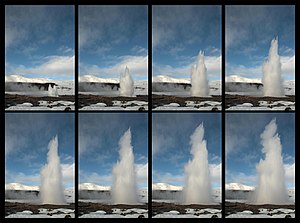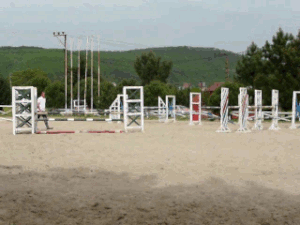Burst mode (photography)




Burst mode, also called continuous shooting mode, sports mode, continuous mode, or burst shot, is a shooting mode in still cameras where several photos are captured in quick succession by either pressing the shutter button or holding it down.[1] This is used mainly when the subject is in successive motion, such as sports photography. The photographer can then select the best image of the group or arrange them in a sequence to study the transitions in detail.
Details
[edit]The speed at which successive photographs can be captured depends on several factors, but mainly on the processing power of the camera.[2] Disabling certain features such as post processing which the camera applies automatically after capturing each image will usually allow a faster rate of capture. While some cheaper point and shoot cameras may have a multi-image burst function which allows them to capture a number of frames within a second with a single shutter button press, most film and digital SLR cameras will continue to actuate the shutter for as long as the button is held down, until the memory card fills or the battery runs out, although the rate of capture may significantly slow when the camera's data buffer becomes full.
Burst rate
[edit]Frames per second (FPS) tells the rate at which a camera is taking photos. Burst rate tells how many frames can be taken in quick succession, before the frame rate slows down.
Use
[edit]Cameras capable of high continuous shooting rates are much desired when the subjects are in motion, as in sports photography, or where the opportunities are brief. Rather than anticipate the action precisely, photographers can simply start shooting from right before they believe the action will occur, giving a high chance of at least one frame being acceptable. Most modern digital SLR cameras have continuous shooting rates of between 3 and 8 frames per second, although very high end cameras such as the Canon EOS-1D X Mark II are capable of 14 frames per second with full autofocus, or 16 frames per second when in mirror lock-up mode. The Panasonic Lumix DMC-GH2 is capable of recording 40 still images per second in burst mode, at a slightly reduced resolution. In March 2014, Nikon claims its Nikon 1 V3 mirrorless interchangeable-lens camera has the world's fastest burst mode of 20fps Auto Focus tracking and 60fps at the first shot autofocus, both in 18.4MP full resolution. The claim is among digital cameras with interchangeable lenses (including (its) DSLR).[3]
Most high-end camera phones and some mid-range phones, and a few low end ones, provide burst shooting. For example, the Samsung Galaxy SIII Mini can capture 20 photos continuously at 3.3 fps by tapping and holding the shutter button. Other examples include: Samsung Galaxy Note 3 at 4-5 fps, Apple iPhone 5S at 10 fps, or up to 30 fps with special software,[2] and the ASUS Padfone Mini at 16fps.
References
[edit]- ^ "Burst Modes - and How They Work - Photo Review". photoreview.com.au. March 17, 2014. Archived from the original on March 17, 2014. Retrieved March 17, 2014.
- ^ a b Curtis, Sophie (January 6, 2014). "Apple buys 'burst mode' camera app SnappyLabs - Telegraph". The Daily Telegraph. London. ISSN 0307-1235. OCLC 49632006. Archived from the original on March 17, 2014. Retrieved March 17, 2014.
- ^ "Nikon 1 V3 - 18.4MP Mirrorless Camera with 3" Touch tilt LCD, Fast Performance". Retrieved December 21, 2014.